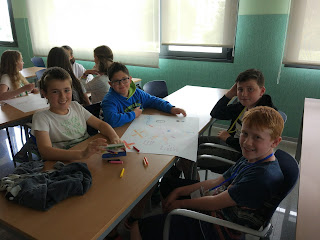The students from Year 6 of Saint Mary of the Angels had Internet Safety Week in February, and this year safer Internet Day took place on Tuesday, the 11th of February 2020.
Our joint project is called "Digital skills for all" and so we wanted to celebrate Safer Internet Day with our colleagues from Saint Mary of the Angels.
Immediately before our video conference, the students from year 6 had a class all about E-safety with a policeman. We also received a talk from the Spanish police during the last visit of English students in June 2019. The specific theme for this year was “Together for a better Internet “, perfect for our project.
So on the
afternoon of Tuesday, the 11th of February we had a video conference with the
students from year six of Saint Mary of the Angels. They are a little bit
younger than us and so we decided to give them some tips on how to use Internet
safely. These are the seven different tips that we read aloud to our little
English friends:
1. Create a
private account.
Security is the most important thing on internet. It’s
easy to set up a social media account, but you must choose the highest privacy
settings.
Google yourself and see what information and images
appear. You may get a surprise and see that your profiles and photos are not so
private after all.
2. Have a safe password
You have to think of a password that is difficult for
other people, but easy for you to remember. Your birthday is not safe enough.
It’s a good idea to choose a mix of number, symbols
and capital letters
For example: LwCi2019at.
Because Liverpool Won Champions In 2019 Against Tottenham.
3. Don’t talk with strangers
Do you know the expression “Stranger Danger”? On the street,
you don’t talk to strangers, or share photos, or give out personal information
to people that you don't know.
You must behave in exactly the same way online and
dont give information or photos to anyone you don't know.
4. Never
reveal personal information.
Don’t reveal any personal information (your full name
and address, your phone number, the school where you study) to people you don’t
know.
If anybody asks for this information, you must tell a parent or a teacher.
5. Don’t
send inappropriate photos
Don’t take inappropriate photos, and definitely DON’T
send them.
If you send a photo and later regret it, ask the other
person to delete it. And watch them do it. If you receive an inappropriate
photo, tell a parent or teacher and report it.
6. Don’t
publish photos of other people without their permission
If
you take someone else's photo from a social media page and repost it without
permission - even if you are in the picture - you are breaking the law. You are
using the image when you do not have the permission to do so.
Never
take photos of classmates or teachers when you are at school.
7. Be
respectful to others
Be
respectful – and expect respect. Respect for yourself and other people is
important in all relationships, and it's no different when you're online.
It is easy to type something when you are hiding behind a screen. But remember, there’s also a real person at the other side of the screen, so be respectful and polite to others online.








Comentarios
Publicar un comentario